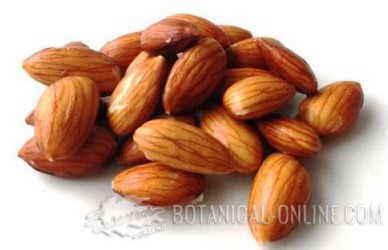Benefits of the minerals in almonds
Nutritional benefits of minerals in almonds
 Almonds, being nuts, have very little water, which means that they have a highly concentrated nutrient content. This means that they are a food with a large amount of nutrients in very little quantity or volume of food.
Almonds, being nuts, have very little water, which means that they have a highly concentrated nutrient content. This means that they are a food with a large amount of nutrients in very little quantity or volume of food.
What type of minerals do almonds have?
If we think about the minerals and benefits they provide us, almonds contain the following:
Calcium in almonds
Almonds have a high calcium content, much higher than all other nuts (with the exception of sesame seeds), since with 100g of almonds we provide 25% of the recommended daily amount of this mineral.
They are a good source of calcium that helps maintain strong teeth and bones, preventing the onset of osteoporosis. In this sense, their magnesium content is also important, which, together with calcium, helps maintain healthy bones.
Despite their richness in calcium, we must bear in mind that almonds should not be the only source of this mineral since their phosphorus content is higher than their calcium content. This imbalance in favor of phosphorus can favor decalcification, if it is not compensated with other foods in which the calcium-phosphorus ratio is higher in favor of calcium. (More information on decalcification of bones).
Vegetable drinks made with almonds are usually enriched in calcium.
* See: Calcium in almond milk
Phosphorus in almonds
Almonds are rich in phosphorus, since 100g of almonds contain more than 86% of the recommended daily amount of this mineral.
Phosphorus helps us maintain a correct state of the central nervous system, connections and brain function. It improves physical resistance and intervenes in the formation of bones and teeth.
Although we should bear in mind that this high amount of phosphorus, compared to calcium, is decalcifying, as we have seen previously.
Iron in almonds
Almonds are a source of plant-based iron, so their absorption is lower. In quantities of 100g of food, almonds have a content comparable to 100g of spinach, but we should bear in mind that we do not consume these quantities.
A serving of spinach can reach 300g, while one of almonds is 20g. Therefore, almonds are a way to complement and vary our diet in a very healthy way. To cover an iron deficiency, such as a situation of anemia. The ingestion of almonds will be beneficial in this regard.
Magnesium in almonds
Almonds contain a high amount of magnesium. By just taking a serving of almonds (20 units), we provide 20% of the recommended daily amount. This mineral has many and various effects on our body. It has a de-stressing action, helps relax the muscles.
They also reduce anxiety, nervousness, irritability, etc. by interfering with the central nervous system and the transmission of electrical impulses from the nerves. They help to fall asleep more easily in case of insomnia, to sleep better and to rest.
They also have an alkalizing effect, which means that they basify our body, reducing their acidification. They favor the adrenal function, responsible for the production of many hormones.
they also intervene in the metabolism of essential fatty acids, regulating the conversion of omega 3 fatty acids into DHA. DHA is an essential fatty acid for proper brain function and takes care of our retina.
Manganese and copper in almonds
Almonds are also rich in manganese and copper, since a serving of almonds (20 units) provides us with 45% of the recommended daily amount of manganese and 20% of the recommended daily amount of copper.
Together with vitamin B12 (cobalamin), these two minerals help in the production of energy, since they are essential cofactors of an enzyme, called peroxide dismutase, that fights against free radicals produced inside our body.
Selenium and zinc in almonds
Almonds are high in selenium. This mineral has an antioxidant effect that helps combat free radicals and prevents heart disease and cancer.
They also contain zinc, with which they share the antioxidant effect. But, in addition, zinc intervenes in the formation of muscle tissues, bones, hair, nails and the retina, regulates insulin levels, controls growth, interferes in ethyl detoxification, among other actions as important as helping to boost immune system and intervene in the process of sexual maturity, in the male gonads.
Potassium and sodium in almonds
Potassium is an important mineral that participates in nerve transmission and muscle contraction, including the heart, becoming an essential mineral for maintaining blood pressure and normal heart function.
Due to the content of this mineral that we find in almonds, they can be considered that their consumption can promote cardiovascular health, protecting us from hypertension, since they regulate blood pressure, and also from atherosclerosis.
In addition, they regulate the elimination and retention of fluids from our body, together with sodium, of which almonds also contain small amounts of this mineral.
Almonds not only contain minerals with beneficial effects, they also contain vitamins and other important nutrients, with remarkable and healthy effects for our body.
![]() More information on almonds
More information on almonds








